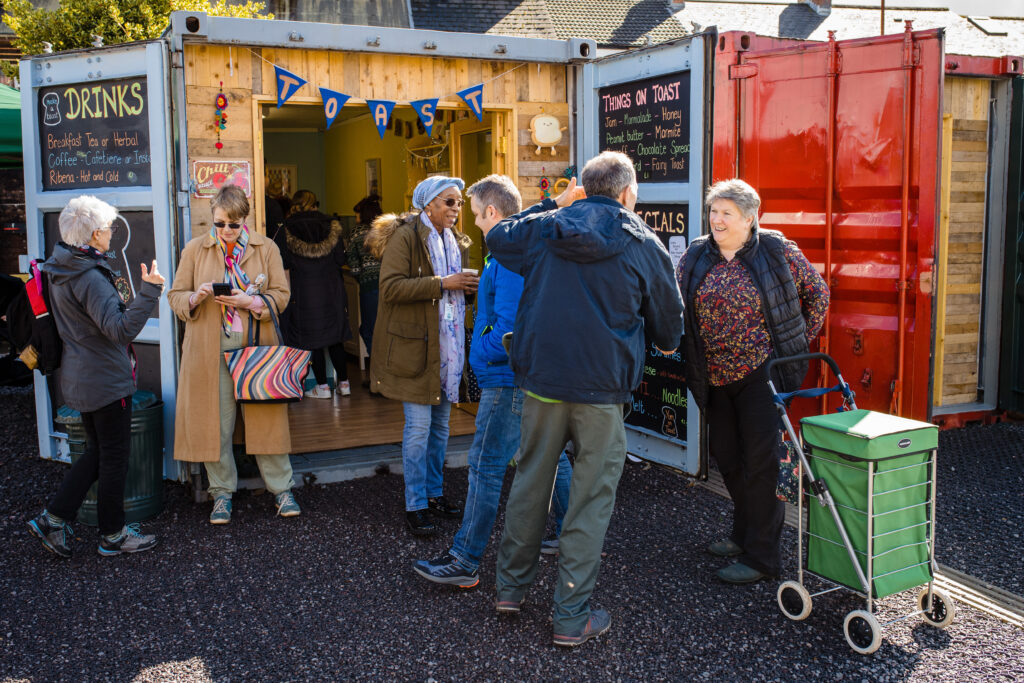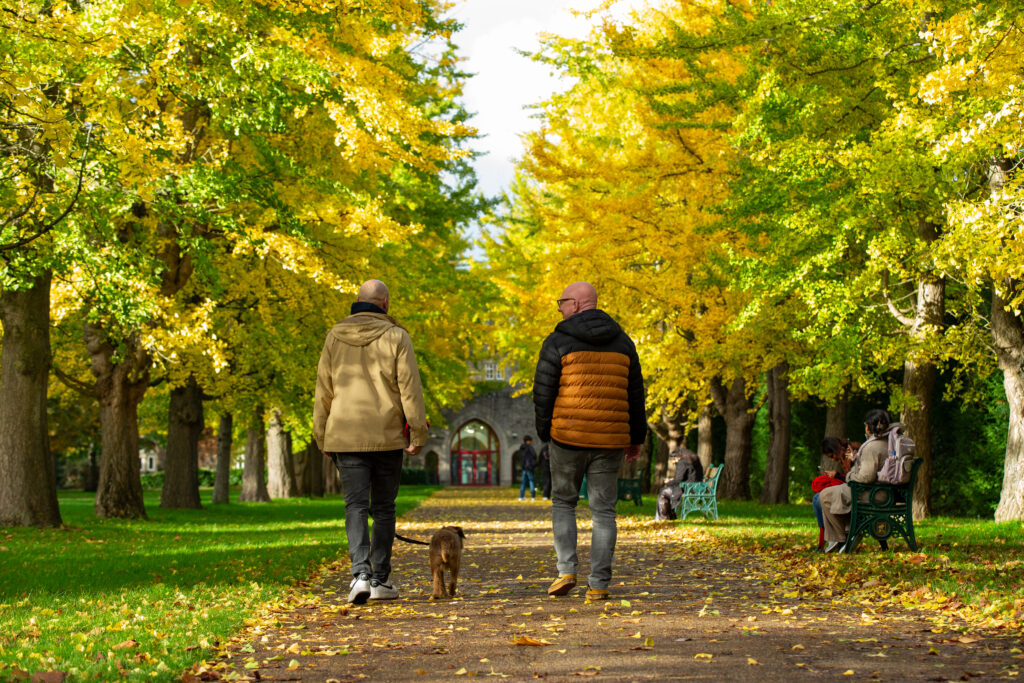Beyond green consumerism, Heledd Williams outlines a vision for what a green economy based on communal values could look like in Wales.
For some years now, ethical and green consumerism has been the privilege of those who can afford it.
From electric cars to insulating and putting solar panels on your home, sustainability costs a lot of money. Even growing your own fruit and vegetables often seems to be the preserve of those who live in stable, long-term accommodation with a decent sized garden. Organic and locally grown produce is also expensive.
Technology advances aimed at preserving our consumerist lifestyles come with equally questionable impacts. Minerals that are essential for solar panels and electric cars have a hefty human and environmental cost. We only need to look at the cobalt mines in Congo and lithium mines in South America to see that these technical ‘solutions’ may not be as green or ethical as we would like to think. Children as young as three are working down the mines in Congo, and beaten, sexually abused and killed as part of the cobalt economy. Mining destroys the possibility of subsistence farming. Lithium mines pollute local ecosystems, disrupt and kill wildlife and destroy indigenous communities’ land and ways of life.
A green economy designed to satisfy western convenience is simply a form of neo-colonialism. Instead of reducing consumption, we are following an extractive logic and using finite minerals in technology to avoid having to change the car-centric and media-saturated lifestyles we have grown accustomed to.
This is of course very profitable for those who gain power over the market economy that fuels this lifestyle. Furthermore, it feeds the narrative that those who can’t afford to change their consumption patterns are not doing their bit for the environment. In the perverse logic of green, or ethical, consumerism, those on the lowest incomes are the scapegoats.
Syniadau uchelgeisiol, awdurdodol a mentrus.
Ymunwch â ni i gyfrannu at wneud Cymru gwell.
‘The master’s tools will never dismantle the master’s house’, said activist and poet Audre Lorde. The paradox of green consumerism is that it tries to do just this. In Wales, where a third of children live in poverty, this model of a green economy is senseless.
What would a truly green economy for Welsh communities look like? On the surface, perhaps it would feel like we have gone back in time. My grandmother lived on a farm near the small village of Rhosygwalia. She grew vegetables and made butter and cheese from milk taken from cows on the farm. Nothing was wasted – foil was reused and cereal packets were cut up and used as note paper or cards.
There is no time to make a meal from scratch, never mind growing food or making cheese. We are doing an unpaid ‘second shift’.
Today my daughter, partner and I live in Cardiff, a far cry from this old way of life. However, my partner’s family are Kurdish, and their home life presents parallels with my late grandparents’. When we visit their house there is usually homemade cheese, yogurt, butter, jam, food growing in the garden or window ledge and the most amazing dishes made from scratch; what feels like a rural way of life, in the middle of the city.
This is quite different from the home life of my friends with young families. Like most women in Wales, they work outside the home. While accessing the workplace was once seen as liberation, it certainly doesn’t feel that way when you consider women get paid less, end up in thankless caretaking roles in the workforce and on top of this still have to hold down the running the home and the carrying the mental load of the family in most cases. This imbalance is made clear by feminists such as bell hooks, who pointed to the limits of liberal feminism’s focus on women’s access to the worksphere, often at the cost of exploiting black and poorer women in domestic spaces. There is no time to make a meal from scratch, never mind growing food or making cheese. We are doing an unpaid ‘second shift’.
For those without time or capacity to cook and clean, women who can afford it outsource this work to cleaners and takeaway workers – usually working class, poor and migrant people. Women who can’t afford this outsourcing end up needing to buy processed food or readymade meals and are chronically stressed and tired, because poverty usually means being time-poor too.
I am not saying my partner’s relatives or my friends have a more or less difficult life than one another. Both experience patriarchy in their everyday lives, from isolation and rigid gender roles to the pressures of working inside and outside the home. However, the work women do within the home to provide sustenance for their families and communities has been severely undervalued. This is not to say women should stop working and become housewives, but that everyone should see the value in “housework” and this work should stop being gendered.
Feminist and ecofeminist thinkers such as Maria Mies, Vanadana Shiva, Silvia Federici and Abdullah Ocalan have explored the patriarchal devaluation and invisibilizing of the gendered labour of housework and care work in detail.
As early as the 1970’s, Silvia Federici suggested that if women’s work in the home was remunerated, it would become more visible and give women a method to fight for their rights as workers. Influenced by ecofeminist thinker Maria Mies, Kurdish leader Abdullah Ocalan praises a precapitalist home economy led by women and argues turning back to this might have a lesser detrimental environmental impact.
When communities are alive the line between the home and the rest of the community becomes blurred. People share the things they need to live, spend more time communally and have the infrastructure to do so.
These projects don’t create dozens of jobs or produce wealth, but they build community, in the sense that they help make the invisible economy of maintaining day to day life easier and more pleasant.
From austerity policies shutting down community centres and libraries, to institutions like chapels that were used for community activity being sold off, the infrastructure that we have to sustain collective ways of organising ourselves has greatly diminished since the economic crash of 2008, though this was just an acceleration of a trend already well underway.
Yet we see attempts to rekindle collective social life in the homes and communities of new migrant populations, like my partner’s family, and, in a different way, in community gardens. In Cardiff alone, I am aware of projects such as Global Gardens on Whitchurch Road and Railway Gardens in Splott.
The Railway Gardens have a lending library of “things”; both gardens host outdoor play sessions for families; there are numerous skill-shares on growing food and sustainability. These projects don’t create dozens of jobs or produce wealth, but they build community, in the sense that they help make the invisible economy of maintaining day to day life easier and more pleasant. Historically in the UK, squatters and established social centres run by anarchists and radicals have attempted similar sorts of community building projects with free shops, gardens and libraries.
Syniadau uchelgeisiol, awdurdodol a mentrus.
Ymunwch â ni i gyfrannu at wneud Cymru gwell.
There have been many such projects in Cardiff, Swansea and Newport over the years, from Cwtsh in Swansea to the Guilford Peasants in Cardiff and the Newport Action Centre in Newport. I’m most familiar with the squats in Cardiff, where I have lived.There have been squats in Splott, Adamsdown, the City Centre, Canton and several in Roath, one of them hosting an Anarchist Bookfair, all of which focused on creating community spaces.
A lot more needs to happen than the formation of community gardens to combat climate change.
These are not without their pitfalls: I’ve known of land projects in areas where the vast majority of people speak Welsh but the projects are managed by people that fail to see the importance of the Welsh language and thus alienate the local communities. In one example I encountered, the only Welsh speaking local person to engage with the project was a friend that had to do manual labour for the land project as part of their court-ordered community service, with a stark class and language divide not conducive to building community. Those coming into the area seeking a rural idyll were the ones that predominantly benefited. Reducing consumption is not just about changing how we consume, but using our imagination to revitalise our communities. This is the key to a green economy.
Federici summarises the power of shifting our economy by focusing on the way in which we live and maintain everyday social relationships in her essay on community gardens:
‘by pooling our resources, by reclaiming land and waters, and turning them into a common, we could begin to de-link our reproduction from the commodity flows that through the world market are responsible for the dispossession of so many people in other parts of the world.’
Projects like community gardens are not a silver bullet, but initiatives to address climate change need to be rooted in communities. They need to be led and informed by the principles of a home economy I described and animated by a wish to rekindle a more green and communal way of life. Women, and women of colour in particular, have historically been at the centre of this home economy, but this work needs to be de-gendered and cut through oppressive racial and class inequalities.
A lot more needs to happen than the formation of community gardens to combat climate change. Yet projects like that of democratic confederalism, a form of democratic, self organisation addressing structural oppression, that is being practised right now in parts of Kurdistan, offer a blueprint for creating the change we want to see in the world, even while these destructive systems operate around us.
We are facing the crisis of our generation that will define how life will be on this planet for all that come after us. Radical alternatives, such as anarchism, eco-feminist thought and democratic confederalism demand of us to reconsider everything that we take for granted. Technological fixes will only temporarily duct-tape our problems and widen inequality. Transforming social relationships and care has the potential to build community and give us the collective power to reshape our lives and environment. In this monumental effort to create green economies, the revolution starts at home.
This article is dedicated to the memory of Maria Mies.
All articles published on the welsh agenda are subject to IWA’s disclaimer. If you want to support our work tackling Wales’ key challenges, consider making a donation or becoming a member.
This article was commissioned thanks to the Books Council of Wales’ New Audiences Fund.





